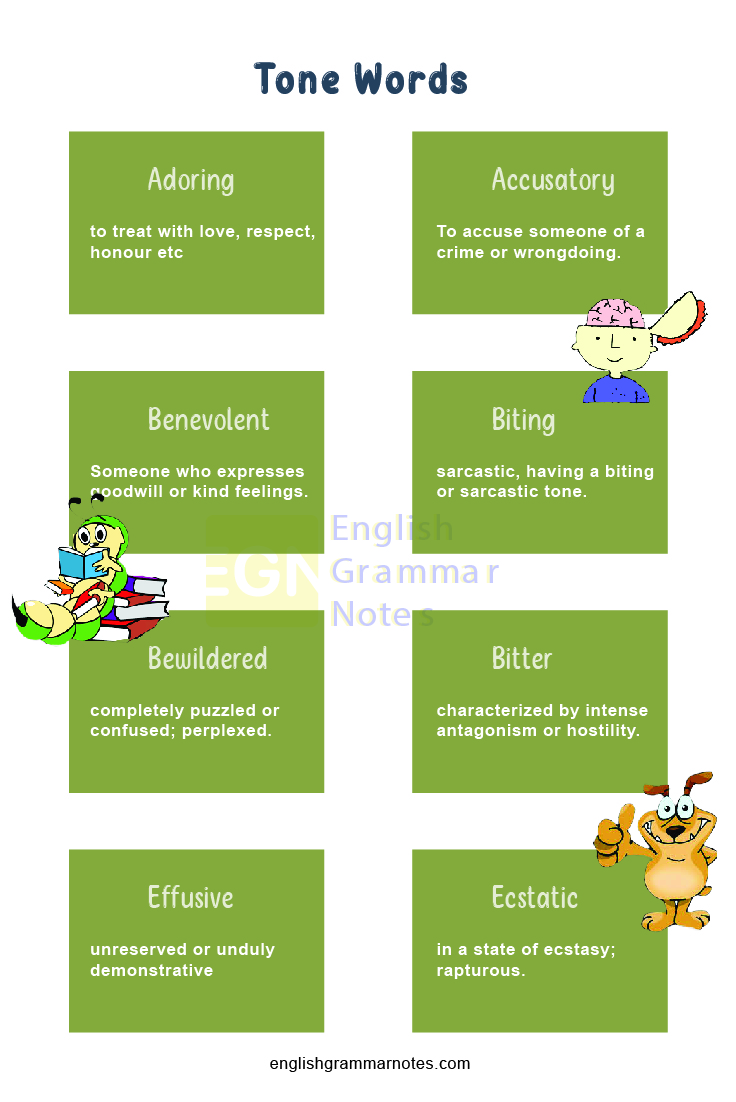In writing, tone refers to your attitude or feeling about the subject matter. Tone words are words used to express attitude, that is, these words help express the author’s attitude towards the subject matter. Words can generally have positive, negative, or neutral connotations. Tone words convey whether the author has a positive, negative, or neutral opinion about what they’re writing about.
For example take the sentence: The speech was so absurd that you are less likely to understand anything. In the above sentence, the word absurd is a tone word, which indicates that the speaker finds the speech silly or useless.
- Tone Vs Voice
- How to find the Right Tone?
- List of Tone Words | Tone Examples
- What are tone words?
- What are some of the examples for tone words?
- Distinguish between tone and voice?
- How can you decide on the right tone to be used?
Tone Vs Voice
Most of us confuse tone and voice and use them interchangeably. However, they are different. As mentioned, tone expresses the attitude of the writer to what he writes. On the other hand, voice refers to the overall personality of the work. The author’s voice may be friendly, informative, sarcastic, etc. A trick to remembering the difference is: Tone keeps on changing and can vary from sentence to sentence. The voice stays consistent.
How to find the Right Tone?
To find the right tone to be used, it is necessary you find answers to these questions:
- Whom am I writing for?
- What am I trying to convey?
- How do I want the reader to feel?
From the above-mentioned points, it is clear that understanding the audience is crucial for identifying the right tone to be used. The type of audience determines your word choice. For example, if you are writing a paper that is to be read by academicians, the words you choose can be difficult. On the other hand, if the article is meant for laymen, it is important that you use simple words.
Read More:
List of Tone Words | Tone Examples
Given below is a list of some of the tone words used in English
| Tone Word | Meaning |
| Absurd | ridiculous; silly. |
| Abashed | ashamed or embarrassed; also, disconcerted |
| Adoring | to treat with love, respect, honour etc |
| Accusatory | To accuse someone of a crime or wrongdoing. |
| Benevolent | Someone who expresses goodwill or kind feelings. |
| Biting | sarcastic, having a biting or sarcastic tone. |
| Bewildered | completely puzzled or confused; perplexed. |
| Bold | Refers to someone who is not hesitant or fearful in the face of danger. |
| Blunt | abrupt in manner; obtuse. |
| Bitter | characterized by intense antagonism or hostility. |
| Ebullient. | overflowing with enthusiasm, or excitement; high-spirited. |
| Effusive | unreserved or unduly demonstrative |
| Ecstatic | in a state of ecstasy; rapturous. |
| Egotistical | vain; boastful; indifferent to the well-being of others; selfish |
| Whimsical | quaint; playful; mischievous; offbeat |
| Witty | clever; quick-witted; entertaining |
| Wonder | awe-struck; admiring; fascinating |
| Worried | anxious; stressed; fearful |

FAQs on Tone Words PDF
Tone words are words that express attitude. These are words that help express an author’s attitude towards the subject matter.
2. What are some of the examples for tone words?
Some of the commonly used tone words include: absurd, worried, witty, blunt, bold, etc.
3. Distinguish between tone and voice?
Tone expresses the attitude of the writer to what he writes. On the other hand, voice refers to the overall personality of the work. The author’s voice may be friendly, informative, sarcastic, etc.
4. How can you decide on the right tone to be used?
To find the right tone to be used, it is necessary you find answers to these questions:
- Whom am I writing for?
- What am I trying to convey?
- How do I want the reader to feel?
Conclusion
Tone words help to convey your attitude toward the subject matter. There are thousands of tone words with which you can improve your writings and make them look creative. The use of such words will ensure that your writings stay lively. However, the use of the right tone is significant. So make it a point to use them wisely.
